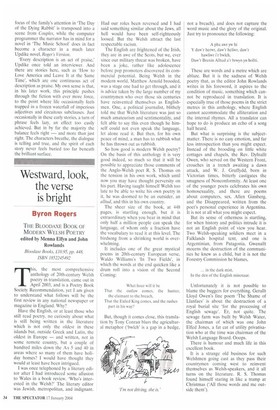Westward, look, the verse is bright
Byron Rogers
THE BLOODAXE BOOK OF MODERN WELSH POETRY edited by Menna Elfyn and John Rowlands Bloodaxe Books, £10.95, pp. 448, ISBN 1852245492 This, the most comprehensive anthology of 20th-century Welsh poetry in translation, came out in April 2003, and is a Poetry Book Society Recommendation, yet I am given to understand what follows will be the first review in any national newspaper or magazine in England. Why? Have the English, or at least those who still read poetry, no curiosity about what is still being written in the literature which is not only the oldest in these islands but, outside Greek and Latin, the oldest in Europe — and written, not in some remote country, but a couple of hundred miles down the As 5 and 40 in areas where so many of them have holiday homes? I would have thought they would at least have been intrigued. I was once telephoned by a literary editor after I had introduced some allusion to Wales in a book review. 'Who's interested in the Welsh?' The literary editor was Jewish, metropolitan, and indignant. Had our roles been reversed and I had said something similar about the Jews, all hell would have been self-righteously loosed. But the Welsh attract the last respectable racism. The English are frightened of the Irish, they are in awe of the Scots, but we, ever since our military threat was broken, have been a joke, rather like adolescence before pop promoters discovered its commercial potential. Being Welsh in the modern world, Matthew Arnold brooded, was a stage one had to get through, and it is advice taken by the large number of my countrymen who over those six centuries have reinvented themselves as Englishmen. One, a political journalist, blithely told me that Welsh literature was just so much amateurism and sentimentality, and felt able to say this even though he himself could not even speak the language, let alone read it. But then, for his own peace of mind, a man has to rubbish what he has thrown out as rubbish.
So how good is modern Welsh poetry? On the basis of this anthology it is very good indeed, so much so that it will be possible to appreciate those comments of the Anglo-Welsh poet R. S. Thomas on the tension in his own work, which until now you may have thought perversity on his part. Having taught himself Welsh too late to be able to write his own poetry in it, he was doomed to be an outsider, an alltud, and this in his own country. The sheer size of the book, at 448 pages, is startling enough, but it is extraordinary when you bear in mind that only half a million people can speak the language, of whom only a fraction have the vocabulary to read it at this level. The birdsong from a shrinking world is overwhelming. It includes one of the great mystical poems in 20th-century European verse, Waldo Williams's 'In Two Fields', in which the words at the end quicken like a drum roll into a vision of the Second Coming: not a breach), and does not capture the word music and the glory of the original. Just try to pronounce the following:
A pha awr yw hi Y daw'r herwr, daw'r heliwr, daw'r hawliwr jr bwlch, Daw'r Brenin Alltud a'r brwyn yn hollti.
These are words and a metre which are ablaze. But it is the sadness of Welsh poetry that, as the editor John Rowlands writes in his foreword, it aspires to the condition of music, something which cannot be reproduced in translation. It is especially true of those poems in the strict metres in this anthology, where English cannot accommodate the alliteration and the internal rhymes. All a translator can hope to do is produce an echo of a song half heard. But what is surprising is the subjectmatter. There is no easy emotion, and far less introspection than you might expect. Instead of the brooding on little white cottages and chapels, the Rev. Dyfnallt Owen, who served on the Western Front, crouches in a trench awaiting a dawn attack, and W. J. Gruffydd, born in Victorian times, bitterly castigates the smugness of Nonconformity. At least one of the younger poets celebrates his own homosexuality, and there are poems about computers, sex, Allen Ginsberg, and the Disappeared, written from the poet's personal experience in Argentina. It is not at all what you might expect. But its sense of otherness is startling, for when history and politics intrude it is not an English point of view you hear. Two Welsh-speaking soldiers meet in a Falklands hospital tent, and one is Argentinian, from Patagonia. Gwenallt mourns the destruction of the communities he knew as a child, but it is not the Forestry Commission he blames, ... in the dark mist,
In the den of the English minotaur.
Unfortunately it is not possible to blame the buggers for everything. Gerallt Lloyd Owen's fine poem 'The Shame of Llanfaes' is about the destruction of a royal burial site 'for the processing of English sewage'. Er, not quite. The sewage farm was built by Welsh Water, the chairman of which was one John Elfed Jones, a fat cat of utility privatisation who at the time was chairman of the Welsh Language Board. Ooops. There is humour and much life in this excellent book. It is a strange old business for such Welshmen going east as they pass their countrymen coming west to reinvent themselves as Welsh-speakers, and it all turns on the literature. R. S. Thomas found himself staring in like a tramp at Christmas ('All those words and me outside them').


































































 Previous page
Previous page